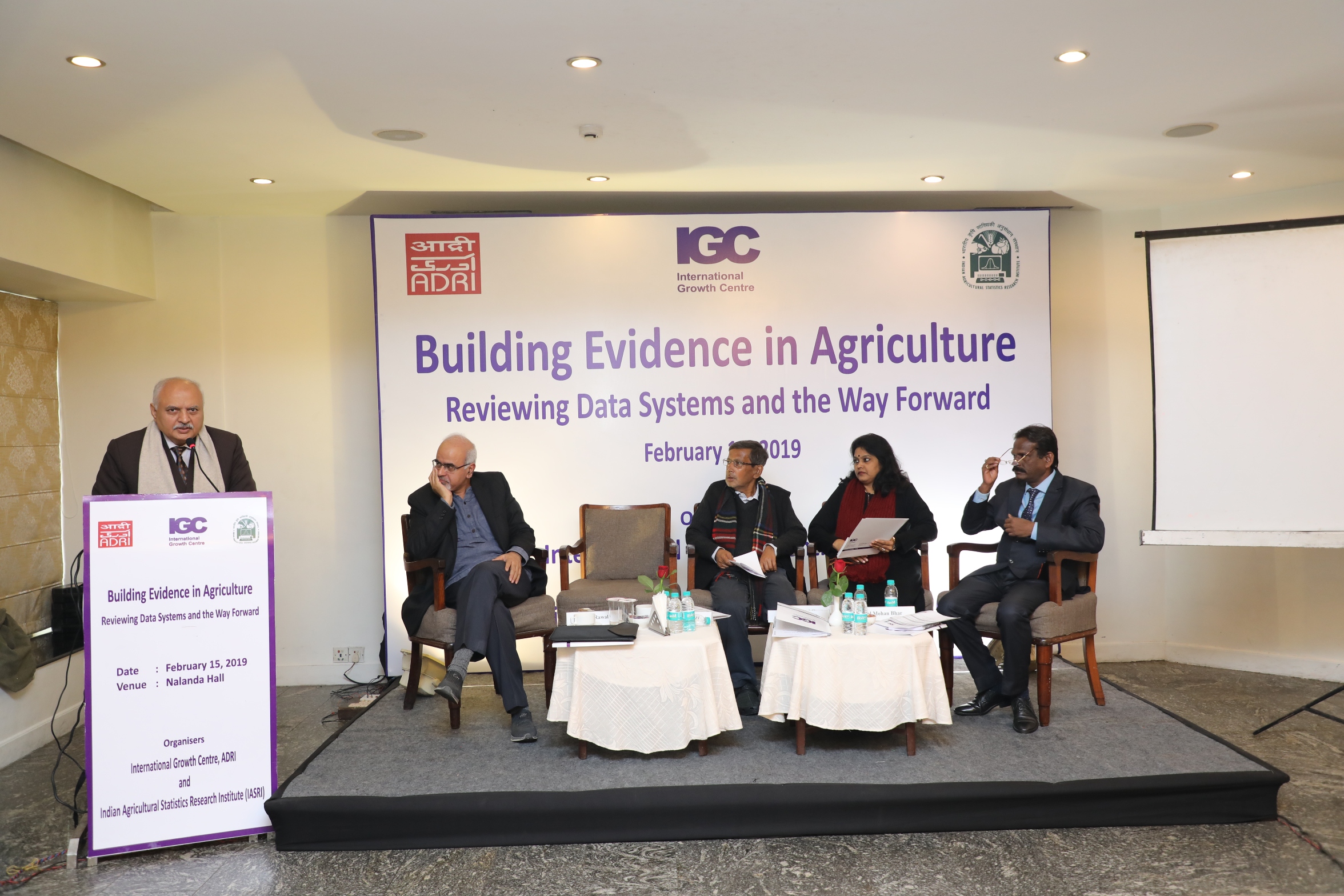Events of IGC

In the age of information, data is available everywhere and grows at an exponential rate. Countries around the world produce data on agriculture, both for the purposes of governing and to disseminate for research. To date, a great deal of our knowledge on agriculture comes from firm surveys, often collected by the National Statistical Agencies, Ministry of Statistics and Programme Implementation (MOSPI) and Ministry of Agriculture. Although these are helpful starting points, they can be burdened with major challenges, including representativeness, frequency and of course, availability. A further issue is that methodologies for data collection can vary widely. Therefore, solely relying on these sources of data to understand and improve policy making is far from sufficient. To address these challenges, International Growth Centre (IGC) India in collaboration with Indian Agricultural Statistics and Research Institute (IASRI), Government of India and ADRI organized an Agriculture data workshop on “Building Evidence in Agriculture: Reviewing data systems and the way forward”. The objective of the workshop was to understand of how we can make sense of data and take advantage of it when making decisions. Prof. Vikas Rawal (JNU, New Delhi) gave the keynote address on different strengths and weakness relating to agricultural statistics in India. Shri Sudhir Kumar, IAS, Principal Secretary, Agriculture Department, Government of Bihar highlighted the fact that the collection of data is improving day by day. Government of Bihar has also started registering its farmers’ and currently 51 lakh farmers had already been registered.
Dr. N Vijayalakshmi, IAS, Secretary, Animal Husbandry and Fisheries Resources Department, Government of Bihar mentioned that data on cattle, goat and poultry have become very important for effective policy decisions. She also highlighted some of the challenges and constraints related to the collection of data at different levels.
Dr. Shaibal Gupta, Member Secretary (ADRI) and Bihar Lead (IGC) gave the welcome address in which he stated that policy practitioners should continuously apply evidence, given that we are in the age of information where data is available everywhere.
One of the concerns which came out of the workshop was that the shortage of trained manpower is a big issue for good quality data.
Prof. Lal Manohar Bhar (Director, IASRI) in his remarks said thatArtificial Intelligence should be applied in sample surveys along with collection and analysis of agriculture data.
Dr. Ramasubramanian V. (Principal Scientist, IASRI) and Dr Kaustav Aditya (Scientist, IASRI) delivered presentations on different statistical methodologies used in agriculture data analysis and decision making in India.
Dr Anjani Kumar (Research Fellow, IFPRI) moderated the panel discussion on reviewing agriculture data systems and the way forward. Nidhi Satija, Deputy Director, DES, Ministry of Agriculture and Farmers’ Welfare and Ajaya Nand Jha, Senior Statistical officer, NSSO, MOSPI talked about different initiatives Government of India is taking to improve the quality of agriculture data.
Prof. Prabhat P Ghosh gave the vote of thanks and highlightedthat most of the problems in data systems are caused because of resourceconstraints especially at the state level.
Brief Details:- In the age of information, data is available everywhere and grows at an exponential rate. Countries around the world produce data on agriculture, both for purposes of governing and to disseminate for research. To date, a great deal of our knowledge on agriculture comes from firm surveys, often collected by the National Statistical Agencies, Ministry of Statistics and Programme Implementation and Ministry of Agriculture. Although these are a helpful starting point, they can be burdened with major challenges, including representativeness, frequency, and of course, availability. A further issue is that methodologies for data collection can vary widely. Therefore, solely relying on these sources of data to understand and improve policy making is far from sufficient. To address the challenges, IGC India in collaboration with ADRI and Indian Agricultural Statistics Research Institute (IASRI), Government of India will organise a half a day workshop on Agriculture Data on 15th February 2019 10 AM - 1.30 PM at Hotel Maurya, Patna. The objectives of the workshop are –
1. How can we make sense of all this data? How do we take advantage of data when making decisions? How do we use data to help us guide the management and planning of our policies?
2. Recognize the importance of the relationship between data analysis and decision-making in public management.
3. Identify the methodology that best addresses the problems for collecting, interpreting and analysing data.